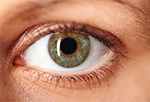
Of all the things we could say about music, here's an unexpected one: Even if you can't follow a beat, your pupils do! That's pretty remarkable! A recent study shows that your pupils dilate more or less in response to changes in musical beats. This suggests people have an innate sense of meter which is the pattern of stronger and weaker beats in music.
Perception of a musical beat is a fundamental human ability and by age four we can detect meter. But we don't understand exactly how we do it. For example just how close do we have to pay attention or if at all to detect a beat? To help answer that question, consider that in rock music, the first beat is more important and you'd guess we'd miss it if it weren't there. But is that a learned response or is it innate?
In order to find out, researchers exposed sleeping infants to rock drum rhythms. They did respond more when the first beat was missing compared to later beats. This suggest humans are able to perceive meter at birth.
Now what about our pupils? One of the things our pupils respond to is that they dilate when we're surprised. So researchers monitored people's pupils as they listened to rock music in which the strong, first beat and weaker beats were imperceptibly dropped randomly.
They found the pupils dilated more in response to the missing beats and more so to the missing stronger first beats. Again, this suggests that people have an innate sense of hierarchical meter and musical training did not influence these results.
So, next time someone accuses you of being a bad dancer, just say, "Tell that to my pupils!"
More Information
Pupillary response indexes the metrical hierarchy of unattended rhythmic violations
Atser Damsma & Hedderik van Rijn. Brain and Cognition. Volume 111, 2017, Pages 95-103.
Did you miss that musical beat? Your pupils didn't
In a new study, neuroscientists played drumming patterns from Western music, including beats typical in pop and rock, while asking volunteers to focus on computer screens for an unrelated fast-paced task that involved pressing the space bar as quickly as possible in response to a signal on the screen...
You may not have rhythm, but your eyeballs sure do
Tracking eye movement gives researchers a peek into how the brain reacts to music...